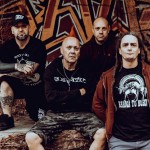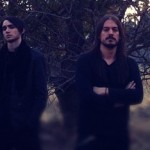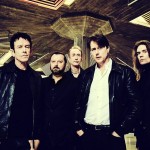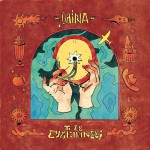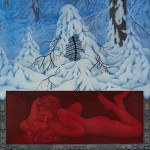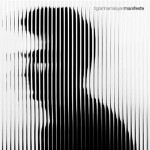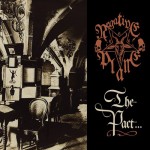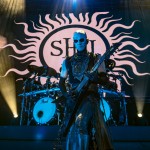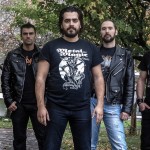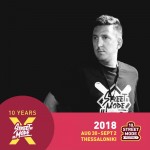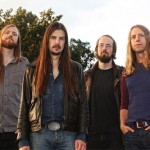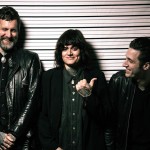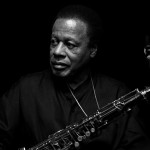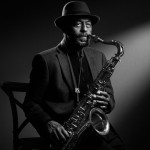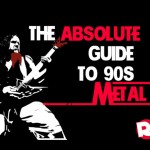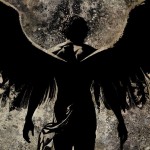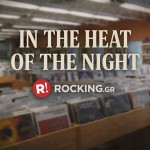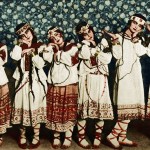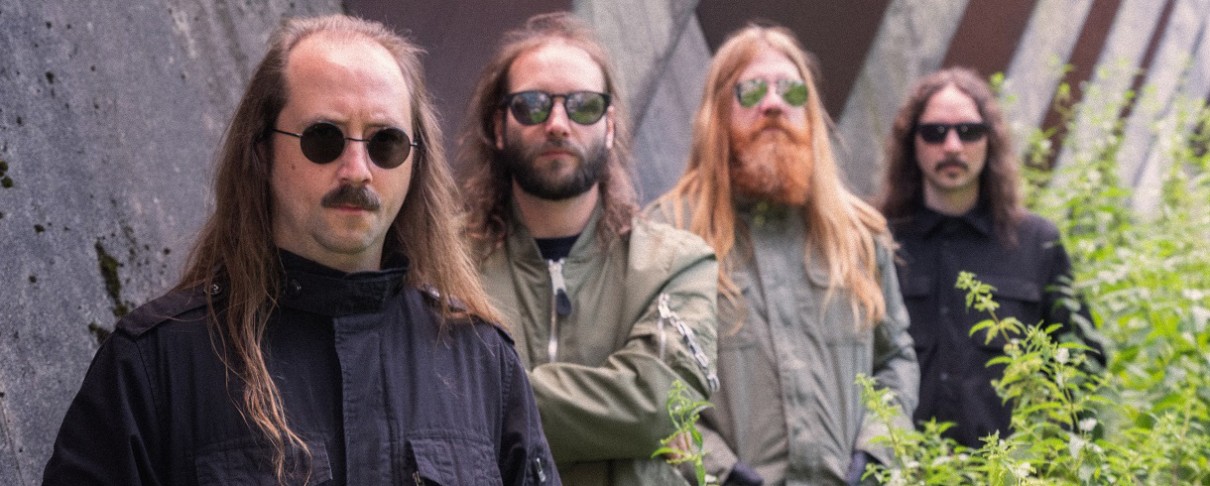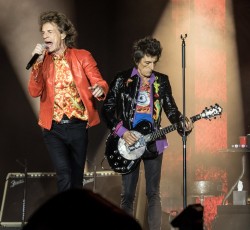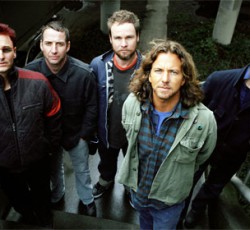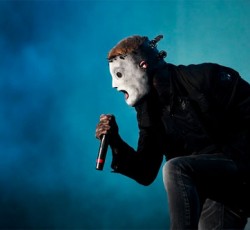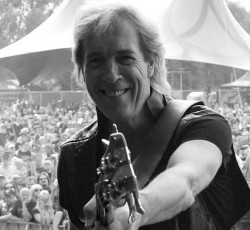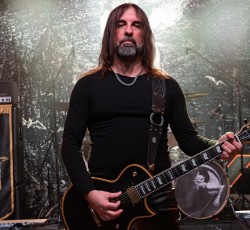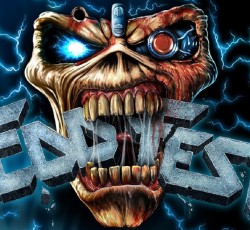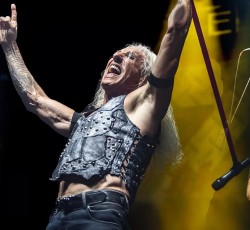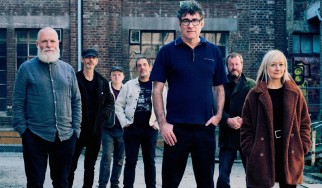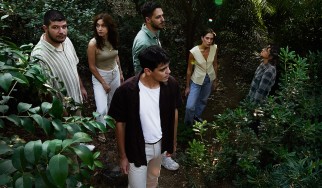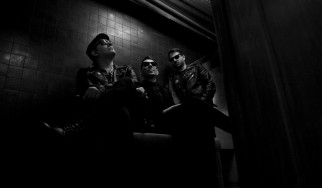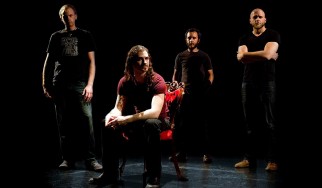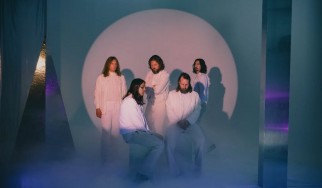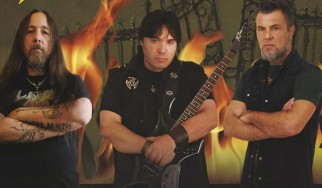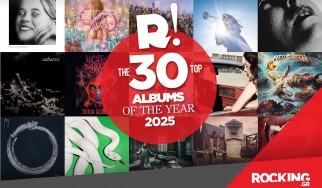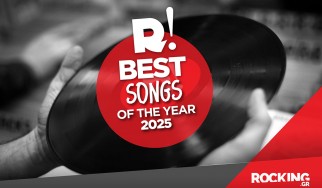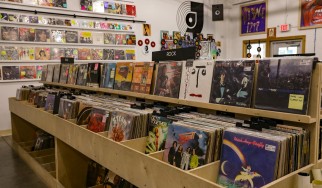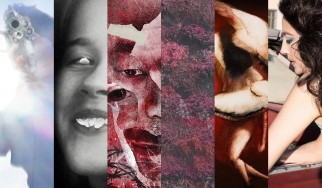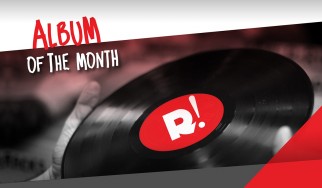Blood Incantation: "There's not been a single day in the world where death metal and progressive rock are not physically touching"
Mastermind Paul Riedl in an in-depth, all-encompassing interview with the leading progressive death metal act, just before their long-awaited first appearance in Greece
Μπορείτε να διαβάσετε εδώ τη συνέντευξη στα ελληνικά.
Few extreme metal bands have managed to capture the universal interest of modern audiences as successfully as Blood Incantation. The progressive death metal act from Colorado, in roughly a decade, has built a now-classic discography through its 3+1 full-length albums, defined by an impressive fusion of technical/old-school death metal with '70s progressive rock and ambient. Unless you've been living under some kind of internet rock, you've surely heard last year's "Absolute Elsewhere", an album that appeared at the very top of every well-informed "best of 2024" list.
Blood Incantation, however, made a strong impression right from the start with their sweeping debut "Starspawn", and of course with "The Hidden History Of The Human Race" six years ago, an album that significantly expanded their audience. As part of their almost entirely sold-out "Absolute Elsetour" across Europe, the Americans are coming to Greece for the first time, performing in Athens on October 16th at Floyd alongside funeral doomsters Esoteric. Knowing what a Blood Incantation live show means, we're preparing for an unforgettable night.
So, we reached out to guitarist, vocalist, and main composer Paul Riedl to dive into the labyrinthine world of this remarkable band. In the following interview, the mastermind of Blood Incantation discusses in depth their compositional approach, the vision behind "Absolute Elsewhere", the deep ties between progressive rock and death metal, as well as the struggles of being an underground metal band today.
Questions: Apostolis Zamparas
Interview: Chris Karadimitris
Editing & Introduction: Apostolis Zamparas

Hello, Paul. How are you doing?
I am doing well, how are you doing, man?
I'm doing fine. We're glad to have you. Where does this interview find you right now?
I live in Denver, Englewood, Colorado.
So it's been almost a year, since the release of Absolute Elsewhere. And I think it was a pivotal album, an album that met a unanimous critical and fan acclaim. Did you expect in any way the acceptance of this record?
We knew it would make an impact. As for acceptance or unacceptance, you know, that's not that's not up to us, but we knew it's a powerful record. We put everything we had into it and we listen to music, we listen to bands, and we know what's going on out there. And when we were writing it, even before we entered the studio, we knew that it was, a lot different from what was going on relative to our place in the scene and also relative to our own stuff in the past. It expanded a lot of ideas that we had started out on our other records. And, you know, we're very proud of the record. It's amazing to see the success that it's brought. But even if it had been a critical failure, we still completely believe in this music 100%. And then when we got to the studio, it was very tangible. You could quite literally feel it in the air every morning when you went into the space.
And we had press in and out of the studio the whole month and, we were shooting a documentary while we were in the studio and the atmosphere was unanimous that something special and interesting was happening. And so it wasn't necessarily surprising that people liked this record. What was more surprising is how many people outside of, you know, Blood Incantation fans in general are a pretty diverse demographic of people, liked it. It was very surprising to see just how far the album is reaching and every couple weeks you know we'll get some notification from our management about some crazy pop culture relevant thing happening that involves the album or something very mainstream and you know it's that's what's interesting and surprising. It wasn't necessarily surprising that people thought it was cool, but to the extent rather, the scope of it.
Great meaningful art can transcend a limitation such as a genre or a scene, even a time and a place or a culture
Did you have an explanation for what was happening in the pop culture and out of the ordinary media, about people talking about this record? Did you at some point thought, well, do they really get it?
I think it's because it's, great music. Music is art and art is a transcendent power and great meaningful art can transcend a limitation such as a genre or a scene, even a time and a place or a culture. And so, what makes powerful art do that is its relatability. People being able to resonate with something inside the music, or whatever medium they choose to express themselves, whether it's a good movie or a good book. And there's a lot to resonate with inside Absolute Elsewhere, in my opinion.
The music is also accessible more so than our previous records. We deliberately tried to streamline some of the riffing. For instance, on "Starspawn", it's this really big, broiling, infernal, rumbling type of sound with these sluggish, gross riffs. And then we cinched it up for "Hidden History…", which is an extremely dense, very intricate and articulate record with as much crammed into a very small space as possible. But that small space, that waveform, you can only have so much bandwidth in each waveform on the mix, you know. So for the new one, we deliberately tried to simplify some of the riffing to give more space for adding things like synthesizers and acoustic instruments and clean vocals, stuff that takes up a lot of space in the mix.
"There's so much melody in all the instruments, even in the vocals
For instance, if we had a record like "Hidden History…", you can't put all the crazy keyboards and all this stuff because there's not enough physical space in the waveform to accommodate that stuff. So we tried to make riffing that was a little more streamlined, like it's still complicated and we're still trying our best to make it interesting, but there's more room to breathe for other stuff in the mix. And so when there's more room to breathe from the riffing, you can embellish it with, ear candy like synthesizers and bells and all this cool stuff that attracts the listener.
Also, there's a really human message inside the album. The lyrics, especially, are resonating to people outside of Blood Incantation's initial orbit. And it's because it's not talking about metal stuff, it's talking about human stuff, it's talking about life stuff, about what it means to be a human and what is consciousness and all these things that are universal throughout time, history, our place in the world, culture. People are always asking these questions. And so, if you like something that sounds good and it's produced well, performed well, and has aesthetically proportionate audio arrangements and stuff like that, if you like heavy music, there's a lot to like. It's brutal and technical, but it's also catchy and melodic. And there's so much melody in all the instruments, even in the vocals. We've always had a lot of melodic guitar parts, but with the synthesizers and the clean singing, it really opens it up for people to hear the melody and that in conjunction with the streamlining of the riffing to become a little less dense and a little less, kind of muddy production, it opens it up for a lot of people to be able to hear it.
And I think the weird thing actually is that the mainstream people coming in and getting into it, the more interesting thing to me is where they heard it. How did they get exposed to this relatively pretty brutal album still? And so like a lot of people who have come to the shows on the last three Absolute Else tours where we're presenting the whole album, when we go back to the end of the set to play old songs, 70% of the audience is not familiar with Hidden History or Starspawn, which is pretty crazy. So I'm very interested to see where or how these people were brought into the Blood Incantation world. But it's very cool to see because it's an increasingly wide variety of people. It's not just a certain type of metalhead or a metal adjacent normal person; it's like, totally normal people. You know, art is a unifying force for good in the world, or at least it can be used for good if you're doing so consciously. And so it's really, quite an honor to actually see the scope that it's expanding.

So, part of the promotion of Absolute Elsewhere is heavy and constant touring. And for example, you're about to visit Greece and Athens for the first time. And if I am correct, there was a previous attempt for you to come here for a show, but then the pandemic struck. So how do you feel about this live show and what should we expect?
It should be great. You can watch many YouTube videos of the tour. Like I said, we play the entire album, start to front, or front to back rather, and then we go back in time to play one song from every album, except for Time Wave Zero. So no matter what era of the band that you're interested in, you'll get a little taste of it at the very least. And we deliberately try to choose old songs which reinforce the overarching theme of the band. So even though it's a song from the demo, there are still synthesizers, there's still clean chanting, there's still these intricate melodic riffs, and then there's also still, you know, brutal Morbid Angel riffs. So you can see that, for 15 years we've had a very linear idea progressing. So it's very cool. We like to play the whole new album. It goes by pretty quick. And then we play an entire other set, basically. And the set we play after Absolute Elsewhere is as long as most of our two previous tours headlining sets were anyway. So you're effectively getting two shows.
You know, part of our team had the privilege of watching your two special shows in Roadburn Festival in 2024 and they came back in awe. So how challenging is it for you to recreate this massive wall of sound in a live setting? How do you prepare and transform your compositions in order to play them live?
I think you're looking at it reverse. We don't make the music until we can play it. So we write it to be played live. So when we're in the studio, it has to be, it's already, we're just playing it as we are. You know, like that's how it sounds at band practice. Even at home with the pre-production when we didn't even have a keyboard player, we were still recording in the practice space and adding the keyboards and we can play it out of the PA and we can be playing along with it. So all we have to do is just show up and plug everything in.
We don't want to make music that wastes our and your time listening to it
I think you also mentioned that you can manage to capture the attention of live audiences despite the nature of our songs, creating an electrified atmosphere. Why do you think the people in this day and age, particularly where attention span is limited, appreciate so much your live shows?
It's as you described. In a time period when attention spans are so limited, when a band takes the time to pay attention to their own art and presents something to you respect to the audience, we are presenting to you something that we believe that you are capable and willing to digest. We don't have to patronize the audience and truncate our music into small, digestible little pieces for you. Because of the attention span of the internet and the social media, damaging people's willingness to engage with art in a meaningful context, it's very easy to dismiss long songs or complicated music or a long movie, a movie without a lot of dialogue, movies with a lot of symbolism, or a book that's a slow burn. But those types of things, specifically because attention is so limited elsewhere, have a more impactful resonance to people. Because when you see somebody that takes the time, it's the same as a home-cooked meal versus fast food. Real art is something that somebody made for you to share with on purpose, because they believe that you're deserving and capable and willing to engage with that art at a high level of respect the creator.
And like I said, it's not meant to be easily digestible fast food music. There are a million other restaurants in the world, so to speak, so we don't need to go to them or, you know, if you owned a restaurant, why would you have a sign advertising a different restaurant in your window? It doesn't make sense. So we want to bring people a show that we would want to see ourselves. We don't want to waste their time. We don't want to waste our time. It's the same with the music. We don't want to make music that wastes our and your time listening to it. We wouldn't make a movie that wastes your time watching it, et cetera. And so that type of mutual respect between the artist and the audience is important. And just because the mainstream internet world has tried to damage people's appreciation for art through increasingly shrinking attention spans, that doesn't really have any effect on actual art.
Now, back to the music of "Absolute Elsewhere". Was the compositional process any different this time around in contrast to your previous two full lengths? And also, I think that the "Luminescent Bridge" single was a pivotal moment for your evolution as a band. Would you agree with that?
Yeah, I mean, "Absolute Elsewhere" was the first time we did significant pre-production. We always record our rehearsals and work on our music and stuff pretty intensely. You know, we'd be practicing 4 to 6 days a week, 4 to 8 hours a day for years straight, just practicing. And during the "Absolute Elsewhere" pre-production, we were adjusting, you know, we would spend weeks deliberating over 1 BPM difference. And we would play it 30 times just to be like, which is it? We were doing that up until the very last day of rehearsal in Berlin before going into the studio. So we were constantly scrutinizing this process, you know, really trying to figure it out. And, like I said, we had the pre-production that had keyboards on it already. And we did that from about November 2022 until April 2023. And then we had to go on tour with Obituary and Immolation. And then we came right back in June and we kept right back at it. And then we went and played Tuska Festival in Finland. Then straight to Berlin, rehearsed for 10 days, all day, from early morning until late at night, and playing the album 50 times in 10 days, really trying to work it out. And then we go into the studio, and then we actually have to start doing it again. And we were still changing stuff in the studio, even, which you can see in our documentary, "All Gates Open", which is available on our YouTube for free. But you can see us developing and discarding ideas in real time.
But the "Luminescent Bridge" was also being worked on during that time. And at one point, the A-side "Obliquity Of The Ecliptic", was only 5 minutes because it was supposed to be a 7 inch for the Sub-Pop single series. And we were in debate with their lawyer and our lawyer for like six months or something. And eventually the contract was too restrictive because they would have the rights to it forever. And that's not how it works for BI. We own 100% of the rights and the masters and have ownership of our music, which is unusual for a band on a major label like ours. But we own all of that stuff. And so we wouldn't have given it up to Sub Pop, even though it would have been a very cool, interesting thing to do, to have a death metal song on a sub pop 7 inch single. But that was going to be a 5 minute song. And eventually, we weren't going to do it. And so we were like, well, maybe we can just do a double 7 inch or something and have it ourselves. But at a major label, by the time you press up a 7-inch, it ends up the unit cost has to be pretty high because of all the people on the payroll. That's why a lot of mainstream labels don't do 7-inch singles. So then we proposed, what about a maxi single, like the 80s? But a maxi single is typically a little bit longer and it would be kind of wasteful to put a four or five minute song on a format that can accommodate 8 to 12 minutes. So on about a week's notice at the end of March 2023, we basically had to decide, okay, we're either going to keep this a short 5 minute song and maybe record it in the summer when we go to Berlin and it can be on the album or something. But it didn't really fit the album. So we were like, well, we just have to stretch this out. So that's where the whole back end of this album, which has, this atmospheric kind of prog metal part and then it turns into this really epic guitar solo. And you know, that whole stuff came very, very spontaneously as we had about a week to figure this out.
At the same time, the title track, the Luminescent Bridge, this was originally going to be like an interlude similar to how we had done on "Starspawn" with "Meticulous Soul Devourement" or on "Hidden History" with "Mirror of the Soul". It was supposed to be an atmospheric acoustic guitar part that connects 2 parts or sits as a little outro. And that was going to be the B side of the 7 inch back in the original concept. And so It was a pivotal moment on one hand because, not only a week before the studio, we physically expand the song, but in the studio recording the title track, we actually... made a decision spontaneously to not use acoustic instruments, to record it on the electric bass and electric guitar, and to add the piano, add the drums, add the trombone, do all this stuff. And so, you know, there was this very free and creative collaborative energy in the studio when we made the title track.
But that was the result or the manifestation of an actually prior critical transitional period for the band, which was "Timewave Zero". Because "Timewave Zero" was the first time the band collaborated completely with four people writing all their parts. Because on the first two records, you know, Isaac and I will write the songs and we'll bring it to practice and we'll show the guys the riffs and then like, okay, you play this one and then here's the harmony. And then that's how most of the other songs are written. I think on Starspawn, it was all, I either wrote it or Isaac wrote "Chaoplasm" and then Morris wrote the instrumental "Meticulous Soul Environment". And then on "Hidden History", I wrote the first two songs. We wrote the instrumental as a group, and then Isaac wrote the whole B-side suite, "The Awakening". And so it was, they were, you know, we were still fleshing them out as a group, but the skeletons always came from Isaac or myself. But with "Timewave", it was the first time where everybody wrote 100% of their own parts. That was actually the true catalyst that allowed "Absolute Elsewhere" to happen.
The stuff we have now is similarly more streamlined and kind of progressive and technical, but also more melodic and more digestible, similar to "Absolute Elsewhere"
And also to create "Luminescent Bridge" spontaneously and change it. Like we were already recording the acoustic stuff. And then we just decided while we were there, you know what, we're not going to use that actually. And so go get our buddy Alex played the trombone and then adding the drums like these big funeral doom drums to make this like space atmosphere stuff that was very spontaneous. And that spontaneity directly translated over to our "Absolute Elsewhere" process because we were doing that all day every day for a month in the studio. And so that is kind of now we're interested to work more like that where everybody has a say and everybody can not feel restricted about bringing an idea to the table. Because even if we don't do it, like as you can see in the documentary, even if we don't do it, we'll spend the time trying to make it work. And nobody's disappointed or mad. If it doesn't work out, it can just, you know, at least we tried. And so then we keep moving.
And so I think, moving forward, that the stuff we have now is similarly more streamlined and kind of progressive and technical, but also more melodic and more digestible, similar to Absolute Elsewhere. And I think people, it's still very brutal, still very BI, but I think people will be surprised because each one, each release is different. You know, we don't want to have any of them be the same. There won't be Absolute Elsewhere Part 2, just like there won't be Starspawn Part 2, but each one retains the quintessential elements that make BI Yeah. And, I think the collaborative, mutual creative energy is really a powerful way to make this stuff. And we got our best results so far by doing that. So we'll definitely be doing that in the future.
Humans are just vessels for art that exists outside of our brain and we have to try to archive it in the human realm
Yeah, I bet you'll do. Now, when I listen to Blood Incantation, I think that I can sense your deep understanding of both death metal and progressive rock and ambient music. So when you come about to do a transition inside your compositions from a musical theme to another, what do you try to achieve so it can be done so smoothly?
We just do it. We just find the way that feels the best when you play it. You know, we don't like what we call connecting riffs, a riff that only exists to get from this riff to that riff. Each riff has to be important. And so if the transition between this riff and that riff is too jarring. We will actually sometimes add like 4 riffs, you know, to make it into a whole new section between the two. And, you know, I love the just hard cut one guitar, drum roll, blast into the next beat. We did that excessively kind of on our first two albums. But for "Absolute elsewhere", we tried consciously to make the changes without stopping the drums and without cutting to one guitar. So most of the changes happen constantly, which in the live environment means that there's no time to, get a drink of water or, you know, fix your hair or pick up a pick if you drop it, because your hands are on the fretboard the entire song. Like there's only one section in each, the "Stargate" and "The Message" where I personally take my hand off the fretboard. So that type of stuff, it has to sound good, feel good, feel natural. the song writes itself. We're not out here constructing it like some architectural structure. We're just human, humans are just vessels for art that exists outside of our brain and we have to try to archive it in the human realm. And so it has to be this way because but you just can hear naturally which way it's supposed to go. You hear if it's an ugly transition, you hear if it's a smooth transition, and, you know, everything has to be in service to the song. And the most important part of the song is the riff, which is why I said we don't like connecting riffs. You know, everything has to have a place.
We always talk about Conrad Schnitzler, of Tangerine Dream who did the legendary intro "Sylvester Anfang", for "Deathcrush" by Mayhem
Right. Now, how do you think the two artistic areas, death metal and prog rock, intertwine as far as what feelings and soundscapes they can evoke?
I think they're thoroughly intertwined, really. I mean, you wouldn't have death metal without progressive rock, that's obvious. You wouldn't have any extreme metal without kraut rock, because kraut rock gave birth directly to post-punk and punk. Punk gave birth to hardcore which gave birth to crust, which became grind, which became death metal, which became black metal. It's a direct lineage. You know, for instance, we always talk about Conrad Schnitzler, founding member of Tangerine Dream and member of Kluster and his own solo artist who did the legendary intro, "Sylvester Anfang", for "Deathcrush" by Mayhem in 1986, when it was recorded. And they literally went to the guy from Tangerine Dream's house and waited outside of his house begging him to give him a tape. And eventually he gave him a tape of whatever random music on the shelf and said, get off my lawn.
So there's never been an era, there's not been a single day in the world where death metal and progressive electronic music are not physically touching. And so, it's kind of like when you see two siblings, with only one similar parent. Let's say that they're going to focus on all their differences. They're going to be like, "well, I have this type of nose and my eyes look like that and I have these ears." But every person who sees these two people clearly tells that they're related. And that's how it is coming to music from outside of the niche market. So if you come to death metal from prog it might sound a little weird. Or if you come to prog from death metal, you might be like, okay, I don't get it. But if you come to either of those from a musical perspective of understanding themes, dark motifs, tritones, atmosphere, all these, cinematic qualities of both, it's escapism, both of these musics are trying to push in a threshold of extremity of your imagination, your suspension of disbelief. And a person coming to either of those genres from that perspective will see that these two are very similar, just different enough to matter to them, but not in the grand scheme of things.
Τhe death metal well is only thirty-forty years old. The prog and Kraut Rock well is 2 decades older, so there's two decades worth of more music to explore
All right, now, speaking about grog a bit, your album covers, musical passages, the stating and of course the existence of "Timewave Zero" suggests that you're huge fans of the mid-70s era of the genre. If you could make a starter list for an extreme metalhead to dive in this sound, which five albums would you name and why?
You have to just buy our second album, "The Hidden History of the Human Race", because there's a thanks list of over 400 bands that are listed in the back of it. And we thank prog bands, kraut rock bands, ambient bands, new age artists, dark ambient bands, metal bands. And we did that on purpose to give people a direct look into what that type of stuff we're interested in. You know, there's an infinite well of unknown, classic, and cult obscure death metal out there. And the well It's constantly bringing up new, inspiring music, but the death metal well is only thirty-forty years old. The prog and Kraut Rock well is 2 decades older, so there's... two decades worth of more music to explore. So to break it down to just five, I couldn't even recommend 5 death metal records for you to check out. But you know, it's not possible to say, here's five things that will explain it to you. Because everyone's appreciation for music is so subjective. And the things that specifically Blood Incantation likes about prog rock and stuff is not necessarily what everybody else who likes prog. You know, for instance, we just we like Eloy, the German band from Cologne. But Eloy was kind of made fun of for a long time as only appreciated by really nerdy kraut rock guys, because they're not actually a kraut rock band. They're too professional to be considered kraut. But they're very progressive space rock, and they rip off different areas of Pink Floyd as they come by. And so, you know, Eloy Records were $10 until five years ago, even their greatest albums. And so stuff like that, which Eloy record to start with? There's five great ones you need to get.
So each of these bands, you have to have all these things. But, band like Tangerine Dream, they have 100 albums. Klaus Schultz has over 100 albums. It's pretty extreme. And so which one to start with, it's a little more difficult. You know, a list of five is a little too limiting. Maybe if You needed 20. We could start with 20, but we don't have the time for that at this moment. But I recommend reading the lyrics or reading the booklet inside the Hidden History insert and looking at these 400 kraut rock and prog and ambient bands that are listed. And, you know, if you look through it as a metalhead, you'll see all these classic death metal bands and black metal bands. And if you don't recognize the name next to this classic metal band, it's probably a prog band. So just check it out.

All right. What about the current prog scene? Is there any artist that you find intriguing? No idea.
I have absolutely no idea. Steven Wilson played last night and it was incredible. That was great. He was on "The Overview" tour and that was a mind bending spectacle of virtuosity and epic arrangement. And I couldn't believe it. And we're watching Secret Chiefs 3 to Australia in a few months. But again, Stephen Wilson and Secret Chiefs 3 have both been around for over 30 years. So I have no idea.
In 2005, nobody called "Altars Of Madness" or Nihilist old school
Now, you know, Blood Incantation are one of the prominent types of the great death metal revival in the last 10 years or so. Why do you think people keep returning to this sub-genre? Are there any peers of yours that you would like to recommend from this kind of revival of the last two years?
In the mainstream metal culture, death metal wasn't cool for a long time, especially like evil death metal or what is now called old school or whatnot. But, you know, in 2005, nobody called "Altars Of Madness" or Nihilist old school. They just called it not as... cool as whatever super hyper-triggered, ultra-digital compression joke slam like brutal death was happening at the same time. And so when I grew up, you know, listening to Morbid Angel, Autopsy, Grotesque, Nihilist, Crematory and all these great bands like At The Gates. All that stuff that wasn't considered old school. It was just considered irrelevant. The original pressings of these records were like $4. Like I bought "Leprosy" for $4 at a record store as recently as 2011. Nobody cared about that stuff. And so, you know, you could buy an 80s Morbid Angel Tour shirt for $28. But nowadays people are selling Bolt Thrower shirts for $700 and a Gorguts record is $300. It's really fucked up. So I got into stuff luckily way before that. But back then it wasn't called old school death metal. It was just actual death metal, just real death metal stuff.
And so all the bands that kept doing that through the 2000s when it wasn't fashionable, you know, bands like Immolation, Most bands didn't stay as strong as a band. And they're still continuing to put out relevant and meaningful art. Gorguts, Autopsy, At The Gates, Carcass, came back and dropped some of their best stuff. But there was not a lot. In the early 2000s was a lot of death metal that was purely underground because it was mostly mainstream death metal or like black metal symphonic stuff. But in the 00s, stuff started to come out like Nekros Christos, Dead Congregation, Cruciamentum, Grave Miasma, Venenum, in Europe. And then in the US you had bands like Anhedonist, one of my still favorite bands of all time. You had stuff like Ritual Necromancy, that dark, cavernous death metal sound, and then that starts to pick up.
The main pillar of that was Necros Christos, Dead Congregation, and Cruciamentum. Those bands ignited the entire resurgence
But, nowadays, most of the bands I would recommend, like a band like Faceless Burial, or, a band like Mortuous, these bands have been around for 15 years. They just are only now considered to be getting up there. But a lot of our friends' bands are like that, and bands that when Blood Incantation started in 2011, we looked to, for instance, the Bay Area, which had, you know, Mortuous, Vastum, Acephalic, Necrot. That's where we thought everything was happening. Or in obviously Copenhagen with all the David Mikkelsen's bands like Undergang and Phrenelith and all these. That's where we thought the scenes were. And so we were just really struggling out here in Colorado to try to get into participate and contribute in those scenes. And so those were the bands that we played with on our first tour. And so, you know, in Canada, there was Phil's band, Chthe'ilist, and those guys from the Covenant Festival in Vancouver, like Auroch and Mitochondrion. They were some of the first ones doing that stuff. Obviously, Portland is a huge hotbed now. But there wasn't a lot of stuff at the mainstream death metal level during that.
I think honestly, Incantation and Immolation were maybe the only ones who were actively touring just straight death metal at that time. And most of the best ones out there today who are younger, like I said, have still been a band for well over 10 years. But as far as a band that's less than five years old, that I would be like, that's what's going on. That's hard to say, I guess. Boltzer also came out, but that was like 10 or 15 years ago too. So just a lot of that stuff, but the main pillar of that was Necros Christos, Dead Congregation, and Cruciamentum. Those bands ignited the entire resurgence. And they're all still active, I guess Nekros is not there, but Sijjin is. We're bringing Sijjin out on the next Absolute Elsetour in Europe. And you know, that's definitely sick stuff. Stuff like Teitanblood and also those guys were really pushing it.
Everything is more than twice as much as it was even five years ago
One last question, is that since you come from Colorado and the American extreme metal underground, you're aware of all the obstacles that a young metal band has to face in order to even be able to release its music and perform live. So how difficult is the situation right now?
It's never been worse. It's, you know, I've been on tour for 20 years. My first tour was in 2007. My first vinyl record came out in 2006. I've been playing shows since 2002. And it's never been more expensive. It's never been more paperwork, more applications and all this stuff. There's never been less infrastructure around to support artists. There's always been more in Europe. You know, a tour bus was a lot more accessible in Europe. And they're already very expensive. But even before COVID, they were half the price, quite literally. And as soon as COVID happened, it's never gone back down. So now a tour bus is literally twice the price that it was just five years ago. Backline rentals, food, flights, fuel, visas, applications, everything is more than twice as much as it was even five years ago. Which is to say, when I first went on tour in 2007, you know, a full tank of gas would cost $25, even in a van, you know? You can't even buy a t-shirt for $25 at a show in 2025. It's crazy.
I'm actually from Oregon, I'm not from Colorado. I moved here to join a band from back in the day that I had been on tour with my bands in Oregon. And we would screen print our own shirts and you could buy a blank t-shirt for $3 and you could print on it and sell it for 8 bucks. And it was, you'd make your money back, you'd make a little profit and everybody's very happy. We would sell our shirts for $10 postage paid and shipped in the US, $12 international. And you can't even send a tape to Europe for less than $23 right now. So it's sad. It's tragic. Yeah, it's and it's not going to get better. Everything else is just going to increase in price forever for everybody until the entire world blows up.

Here's a positive message to close the interview...
People really underestimate how difficult it is to be a professional touring musician in this day and age. It was a lot easier even 10 years ago. And I've seen a lot of changes and none of them are for the better. There was a couple months when in the US they stopped doing the commission for the selling merch, that mafia shit. And not only did they stop the commission, they would give you a gas card, something like 750 bucks of free gas, and they would waive the selling fee. And they did that for what, six months, eight months? And every single person that I knew was like, this is the greatest thing that's ever happened. And they just stopped it because they dangled the carrot and they're like, wouldn't that be nice if you were treated like a human that deserves respect as an artist providing this nice stuff for society to enjoy music and art and stuff like that around the world? And they took it away. But obviously they're capable of doing it and not collapsing. Their industry didn't cripple anything. They made all the money they still ever made. They just gave a little bit back to the musicians that make it all possible. And I don't know the next time it's going to happen, but it was amazing. Those six months were great.
Thank you very much for your time. See you in Greece…
Yeah, my first time. We're looking forward to it, man.
It'll be great. We can't wait to see you here.

